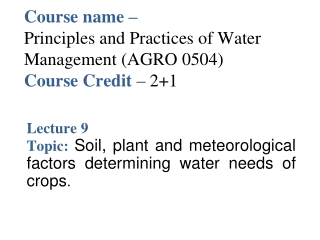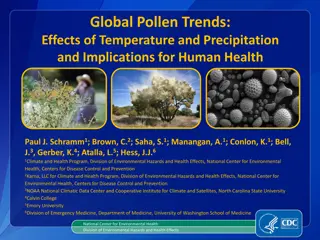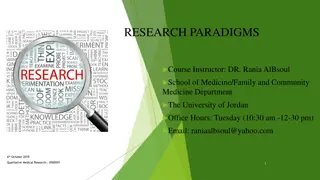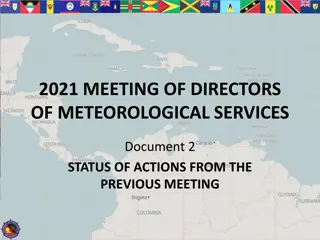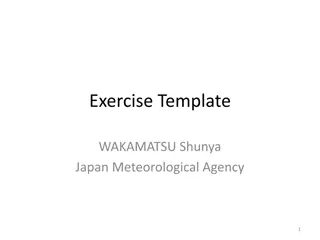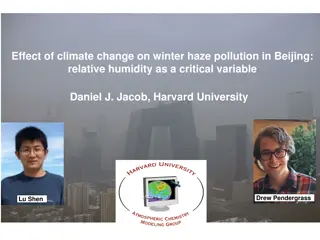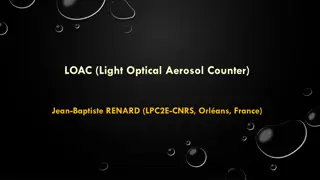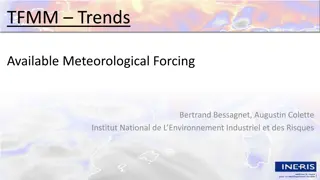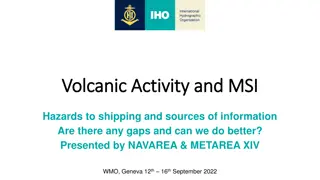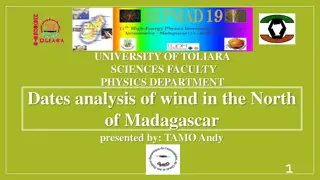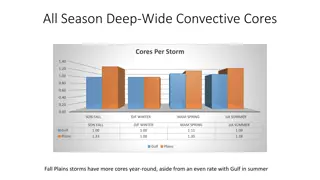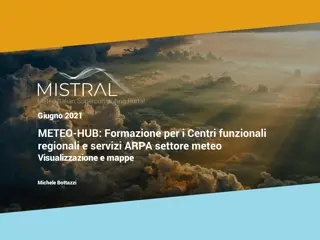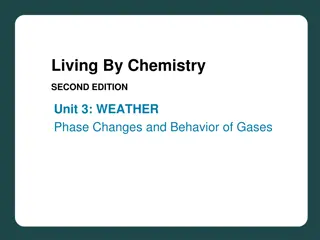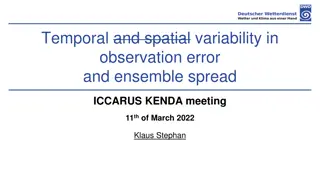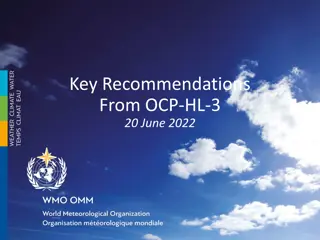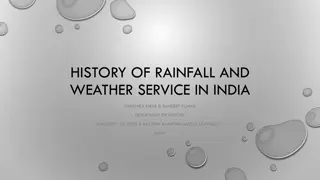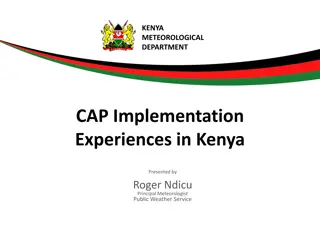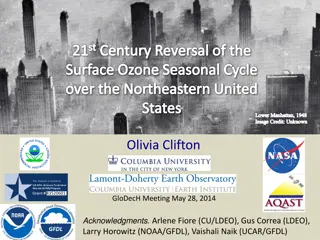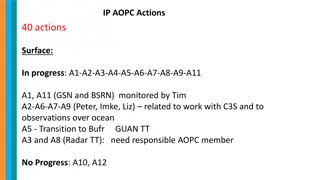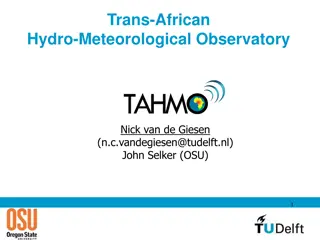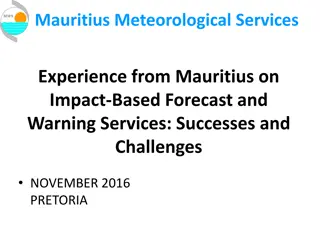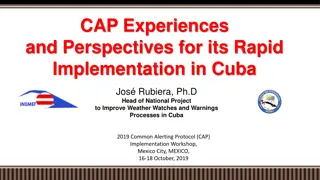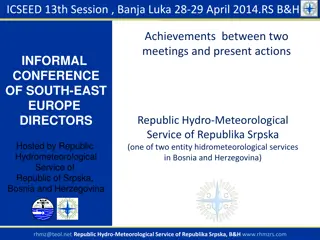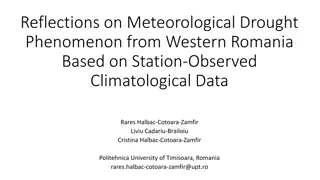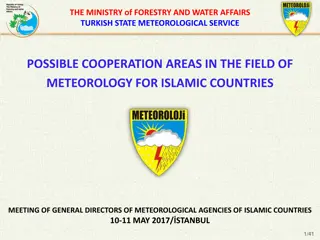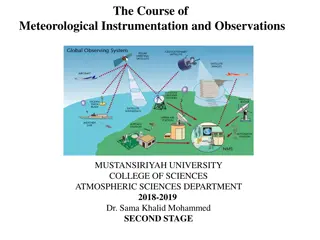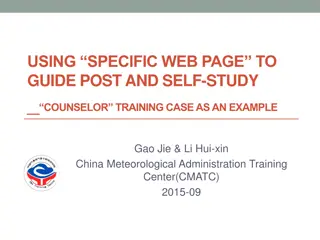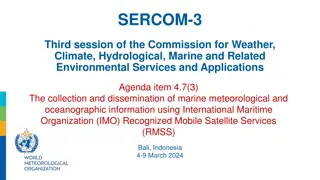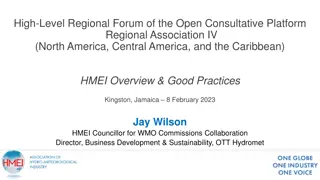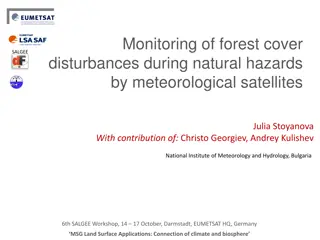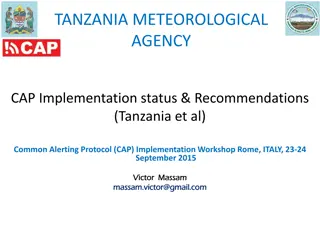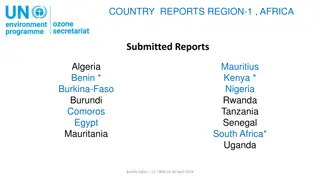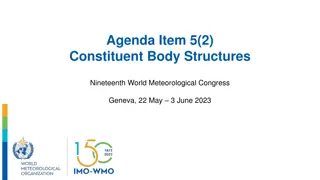Understanding Water Needs of Crops Based on Soil, Plant, and Climate Factors
How soil, plant, and meteorological elements impact water requirements of crops. Dive into the effects of temperature, solar radiation, pressure, wind, and humidity on crop production and growth.
2 views • 19 slides
Advancements in Solar-Terrestrial Research and Meteorology
The Solar-Terrestrial Centre of Excellence (STCE) focuses on ongoing activities and opportunities in the field of meteorology, with a special emphasis on Antarctica. Their annual meetings cover topics like water vapor feedback mechanisms, extreme weather events forecasting, cloud and precipitation s
0 views • 14 slides
Initial Composition and Requirements of GBON for Effective Meteorological Monitoring
The 19th World Meteorological Congress established the Global Basic Observing Network (GBON) to enhance meteorological monitoring worldwide. The GBON includes specific resolutions, guidelines, requirements, and compliance criteria for surface land stations, upper air stations, aircraft data, and rem
2 views • 24 slides
Richard Rotunno: A Legacy of Meteorological Excellence
Delve into the remarkable career of Richard Rotunno, spanning four decades of groundbreaking research in atmospheric science. Explore his educational background, career milestones, awards and honors, and major research contributions focusing on vortex dynamics, thunderstorms, tropical cyclones, and
2 views • 20 slides
UCC Research Support and Strategies Overview
UCC's Research Support, Policy & Strategy function, led by David O'Connell, PhD, provides comprehensive support for research activities at the university. The office manages research funding, monitors performance, and facilitates engagement with external stakeholders. UCC's involvement in Horizon Eu
3 views • 17 slides
Impact of Temperature and Precipitation on Global Pollen Trends and Human Health
Pollen significantly affects millions of Americans with allergic rhinitis, asthma, and respiratory issues, resulting in substantial healthcare costs. This study investigates the effects of temperature and precipitation shifts on pollen production, tracking trends over time through literature reviews
0 views • 15 slides
Overview of Research Problem Identification and Formulation
Understanding the importance of defining a research problem, this content delves into the selection and formulation of research problems, the definition of a research problem, reasons for defining it, methods for identifying research problems, sources of research problems, and considerations in sele
1 views • 11 slides
Understanding Research Paradigms in Qualitative Medical Research
Delve into the world of research paradigms in qualitative medical research with a focus on the key differences between objective and subjective research, the meaning of research paradigms, components of research paradigms, types of research paradigms, and how paradigms guide the selection of researc
0 views • 42 slides
Guidelines for Selecting Research Project Topics in Environmental Health
Research is crucial for addressing environmental health issues. Choosing a good research topic is the first step towards effective research. This paper discusses the meaning, characteristics, types of research, and the research process to help in selecting appropriate research topics. Understanding
0 views • 15 slides
2021 Meeting of Directors of Meteorological Services - Actions and Updates
The document discusses the status of actions from the previous meeting of the directors of meteorological services in 2021. It includes updates on convening a committee for reviewing proposed courses, resolving operational matters, and implementing various meteorological services. The content also e
0 views • 4 slides
Climate Change Analysis by Japan Meteorological Agency
Tokyo Climate Center, under Japan Meteorological Agency, uses climate models to assess global warming effects. The observed trends in Tokyo show a significant rise in temperature but no discernible trend in precipitation. Future projections indicate a substantial increase in temperature with uncerta
1 views • 6 slides
Impact of Climate Change on Winter Haze Pollution in Beijing: Role of Relative Humidity
Relative humidity plays a crucial role in the formation of winter haze pollution in Beijing. Studies show a high correlation between wintertime PM2.5 levels and variables like meridional wind velocity and relative humidity. However, the effect of climate change on Beijing haze in the 21st century is
0 views • 11 slides
Light Optical Aerosol Counter (LOAC) Project Overview
Light Optical Aerosol Counter (LOAC) is a project led by Jean-Baptiste Renard in France, involving a collaboration between research institutions, private companies, and the French Space Agency. The LOAC instrument, weighing 1 kg, is used with meteorological balloons to measure concentrations of aero
0 views • 21 slides
Meteorological Forcing Trends and Hindcasts for Climate Research
The content discusses the available meteorological forcing trends analyzed by Bertrand Bessagnet and Augustin Colette from Institut National de L'Environnement Industriel et des Risques. It explores the rationale behind using ECMWF/IFS for recent campaign analyses and the need to find a consistent 1
0 views • 5 slides
Enhancing Safety Measures for Ships during Volcanic Activity
Analyzing the hazards posed by volcanic activity to maritime shipping, this presentation explores the various risks such as physical damage, loss of stability, and impacts on instruments and engines. It discusses sources of information available, including Volcanic Ash Advisory Centers and Volcanic
0 views • 8 slides
Analysis of Wind Patterns in North Madagascar: A Study by University of Toliara
University of Toliara's Physics Department conducted a study on wind patterns in the North of Madagascar, focusing on interannual variability. The study analyzed meteorological data from 1979 to 2017, using MATLAB software and ECMWF data. The research aims to understand the wind seasons, characteris
0 views • 14 slides
Analysis of Seasonal Variations in Gulf Plains Convective Cores
The analysis reveals fascinating insights into Gulf Plains convective cores, showcasing variations in core numbers, average pixels per storm, pixels per core, and core sizes across different seasons. Deep-Wide cores dominate in the summer, while Gulf cores are larger in the fall. The study sheds lig
1 views • 4 slides
Meteorological Data Analysis and Visualization Tools for Regional Weather Services
Explore advanced tools and technologies for analyzing and visualizing meteorological data in regional weather services. From observational variables to forecast and ensemble models, learn about different plotting methods, interactive features, and map layers used in the field of meteorology. Enhance
0 views • 6 slides
Exploring Weather Phenomena and Meteorological Predictions
Dive into the fascinating world of weather phenomena and the science behind meteorological predictions in this unit of Living By Chemistry SECOND EDITION. Learn about proportional relationships, temperature scales, behavior of gases, and how to interpret weather maps to make accurate predictions. En
0 views • 19 slides
Insights on Observation Error, Ensemble Spread, and Radar Reflectivity in Meteorological Analysis
Explore topics such as temporal and spatial variability in observation error, ensemble spread analysis, baseline observations at DWD, estimation of observation errors, and radar reflectivity analysis. Gain insights into data processing and interpretation in meteorological studies.
0 views • 26 slides
Enhancing Societal Benefits: Key Recommendations from OCP-HL-3, June 2022
NMHSs, research, and the private sector are fostering partnerships to enhance societal benefits. Policies, legislation, and sustained funding are crucial for the sound development of meteorological services. NMHSs must evolve, emphasize socioeconomic needs, and establish win-win partnerships. WMO's
0 views • 6 slides
Evolution of Rainfall Monitoring and Meteorological Services in India
The history of rainfall and weather services in India dates back to the early 19th century when the observatory in Madras began recording rainfall in 1793. The India Meteorological Department played a vital role in standardizing rainfall measurements and providing technical guidance to state governm
0 views • 10 slides
Implementation Experiences of CAP by Kenya Meteorological Department
Kenya Meteorological Department (KMD) has been implementing the Common Alerting Protocol (CAP) since late 2012 to enhance the production and dissemination of weather advisories and warnings. KMD is responsible for generating weather alerts, identifying threat events, and classifying messages based o
0 views • 24 slides
Surface Ozone Seasonal Cycle Reversal Study in Northeastern United States Lower Manhattan
Study on the reversal of the surface ozone seasonal cycle over Northeastern United States Lower Manhattan, analyzing the impact of NOx and VOC emissions on Surface O3 levels. Research shows a 26% decrease in regional NOx emissions leading to changes in the seasonal cycle of surface ozone concentrati
0 views • 24 slides
Progress and Actions in Meteorological Data Exchange
International efforts are underway to enhance the exchange of meteorological data, including SYNOP and CLIMAT reports, to improve data archives and analysis. Key actions involve monitoring data receipt, upgrading web systems for data visualization, and providing precipitation data to global centers.
0 views • 14 slides
Innovations in Hydro-Meteorological Observatories for Sustainable Environmental Monitoring
This document showcases various design principles and technologies used in the Trans-African Hydro-Meteorological Observatory project, aiming to enhance data collection in meteorology and hydrology for sustainable land monitoring. Key features include robust, low-cost, and self-calibrating systems t
0 views • 33 slides
Impact-Based Forecasting and Warning Services in Mauritius: Successes and Challenges
The experience of the Mauritius Meteorological Services in implementing Impact-Based Forecasting and Warning Services is detailed, highlighting successes and challenges encountered in November 2016. The article discusses the main weather hazards faced by Mauritius, such as tropical cyclones, heavy r
0 views • 21 slides
CAP Implementation in Cuba: Experiences and Perspectives for Rapid Progress
José Rubiera, Ph.D., discusses the urgent need for implementing the Common Alerting Protocol (CAP) in Cuba to enhance weather watches and warnings. The challenges faced by the Cuban Meteorological Service are explored, along with plans for CAP implementation in 2020. The overview of Cuba's weather
0 views • 37 slides
Informal Conference of South-East Europe Directors on Hydro-Meteorological Services
ICSEED 13th Session in Banja Luka focused on achievements and actions between meetings of Hydro-Meteorological Services in Bosnia and Herzegovina. The conference highlighted the Memorandum of Understanding between different institutions for cooperation in meteorology and hydrology. Through cross-bor
0 views • 23 slides
Analysis of Meteorological Drought in Western Romania: A Case Study of Timisoara Area
Climate changes in Eastern Europe have led to an increase in extreme weather events like droughts in Western Romania. This article focuses on the Standardized Precipitation Index analysis of meteorological drought over the last 50 years in Timisoara. Results indicate a rise in severely dry months du
0 views • 20 slides
Collaboration Opportunities in Meteorology for Islamic Countries
The Ministry of Forestry and Water Affairs in Turkey, along with the Turkish State Meteorological Service, organized a meeting for General Directors of Meteorological Agencies from Islamic countries in May 2017 in Istanbul. The areas of possible cooperation included observations and observing system
0 views • 9 slides
Meteorological Instrumentation and Observations Overview
Overview of weather maps, symbols, and the weather station model used in meteorological instrumentation and observations. Explains the importance of weather charts in forecasting processes. Also introduces the FM System of Code Forms for reporting weather observations. Helpful resources for students
0 views • 42 slides
Creating an Online Platform for Counselor Training at China Meteorological Administration Training Center
Explore the development of a specific web page to guide counselor training using the China Meteorological Administration Training Center as a case study. The focus is on addressing the needs of counselors through online resources, communication platforms, and pre-training support. Learn about the ba
0 views • 11 slides
Modernization of Maritime Services for Enhanced Safety and Data Collection
The collection and dissemination of marine meteorological and oceanographic information using multiple Recognized Mobile Satellite Services (RMSS) is essential for improving global coverage and data sharing. The modernization of services, including Iridium SafetyCast and INMARSAT, enhances the Globa
0 views • 6 slides
High-Level Regional Forum of the Open Consultative Platform in Kingston, Jamaica
HMEI, the Association of Hydromet Industry, is a not-for-profit organization focused on advancing technologies and sustainability in weather, water, and climate services. They collaborate with international organizations to drive policy, support meteorological services, and engage the private sector
0 views • 7 slides
Monitoring Forest Cover Disturbances During Natural Hazards by Meteorological Satellites
Ecosystem functioning relies on energy, water, and carbon fluxes regulated by vegetation and soil properties. This study focuses on monitoring forest cover disturbances before, during, and after natural hazards using meteorological satellites. It involves analyzing land surface temperature, evapotra
0 views • 37 slides
Implementation Status and Recommendations for CAP in Tanzania Meteorological Agency
Tanzania Meteorological Agency has successfully implemented the Common Alerting Protocol (CAP) under the Meteorology category, enabling timely dissemination of information to the public through various media channels. Recommendations include protocol adoption, system availability, promotion through
0 views • 20 slides
Ozone Observational and Monitoring Activities in Algeria and Burkina Faso
Algeria's National Meteorology Office conducts ozone monitoring at GAW stations in Tamanrasset City and Assekrem. Calibration and data reporting are done regularly to WOUDC. In Burkina Faso, NAMA-BF oversees meteorological observations and is acquiring instruments for ozone monitoring. Collaboration
0 views • 20 slides
Evolution of Constituent Bodies in World Meteorological Congress
The evolution of constituent bodies in the World Meteorological Congress from 1951 to 2019 highlights key structural changes, reviews, repeated proposals, and the 2019 governance reform as a significant event. The continuous process of improvement aims to enhance coordination, management, planning,
0 views • 13 slides
Exploring Research Design and Funding Priorities in Northern Ireland
Dive into the world of research at the upcoming Application and Research Design Workshop scheduled for Friday, 28th May 2021. Discover the strategic priorities driving impactful research initiatives, learn about current research projects, funding processes, and collaborations. Explore the rich histo
0 views • 37 slides
